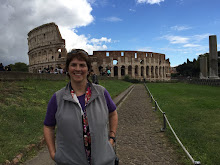I was caught up pretty quickly in the opening chapter, when Teddy Cannon, a young woman with a gift for gambling, enters the Bellagio in disguise to try her big chance at poker. She's been banned from all the casinos in Las Vegas, because she's got a pretty interesting gift: she can tell when people are bluffing. No cheating, just very good at it. But casinos don't like to lose big bucks, so she's on the outs. Unfortunately, she owes a lot of money to a local mobster, who will hurt her and her parents if she doesn't pay him back.
Teddy's run at the table ends in disaster, and resigned to what will probably be a painful meet up with the mobster, she instead is stopped by a man who claims to have the answer for her troubles. Clint, a former police officer, claims that Teddy's gift is actually psychic in nature, and she's just the kind of person he would like to send to a special school for young psychics. He'll take care of her debt to the mobster, and she will spend the next three years in a school near San Francisco.
Teddy is taken aback at the thought that the talent that has gotten her into so much trouble her whole life could actually be as simple as being psychically gifted. All her failures weren't failures, but a gift she didn't know about, and therefore didn't know how to control.
Teddy is smart enough to pack a bag and head to the Whitfield Institute, where, if she survives training in psychic skills, investigative techniques, and SWAT tactics, she will graduate and work for the government. Meeting other young people who also have an assortment of gifts, Teddy realizes she's not alone in her awkward life experiences. There's the usual drinking, and a little bit of sleeping around, but nothing that really detracted from the story. Of course, there is more to the Whitfield Institute than Teddy and her fellow students realize, and it has a lot to do with the mysterious Sector Three, and Teddy's birth parents, who disappeared just after Teddy's birth. Yes, they were psychics, too. And Clint...just what is his role in all of this?
I read reviews on Goodreads, and all people could say was that it was, yawn, "Harry Potter-esque". I disagree. People also said it was a YA novel. I disagree about that, too. I thought Teddy and her cohorts were firmly in adulthood, even if they were in their early 20's. I didn't think they were juvenile at all. Teddy makes some dumb mistakes, but hey, who didn't in their younger years? It's all part of growing up. Honestly, I get very tired of people comparing every novel that takes place at a school, and involves young people with magical or psychic gifts to Harry Potter. Let's decide here and now there are enough talented writers out there who can also write about magic and schools and make them individual enough that they stand on their own. Stop comparing everything to Harry Potter!
Anyway, I was interested enough in the novel to finish it, and I probably would read the second in the series to see where it goes. I'm not sure what I was hoping for; maybe something with a bit more action, and I was hoping Teddy would be a bit better at making decisions and seeing through the obvious weird behavior of some of her cohorts. I kept getting muddled on trying to figure out which side was the bad side, and which side was the good side, and why.
Rating: 3/6 for a series beginning that could possibly become much more intriguing as it continues. Not a bad start, but it has some weak spots. Supporting characters were interesting in their quirky talents, and I have hope that Teddy will mature and become a stronger woman as she faces what are surely going to be darker situations as the story progresses.
Available in paperback, ebook, and audio book.



No comments :
Post a Comment